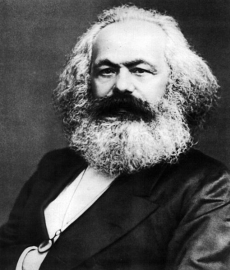
You may already know the name Karl Marx. A German philosopher, sociologist, economist, journalist and revolutionary socialist, Marx is recognised as one of the two founders of the political ideology of Communism. This is the theory of social organization in which the community owns all property and each person contributes and receives according to their ability and needs. In simpler terms, people trade in skills rather than in money. So, the builder builds a house for the baker, who gives them fifty loafs of bread in return. This is all very well and good, but what does it have to do with human nature? In fact, the selfless core of the theory seems to ignore the very selfish part of human nature that everyone appear to exhibit. So here it is: a quick summary of Marx’s theory regarding human nature.
Marx’s notion is based on the idea that humans have no fixed nature. When they are born, they are a blank slate (the posh Latin name for that being tabula rasa). This means that any characteristics people have are given to them by the environment they grow up in. He gives evidence for this belief by stating that there are no cases in history where every single human society has displayed similar, consistent characteristics. Of course, this is apart from biological ones, such as the need to eat, to sleep, et cetera. There is one part of human nature, however, which may not be attributed to biology, but which Marx states features in all human nature. That is, in his words “the need to labour to satisfy human need”. This is more easily understandable as ‘recognising that you have to work in order to get what you need to survive’, i.e. having to farm to get food, having to perform an action to get a result.
But wait, there’s more. As all humans are, in Marx’s words, defined by their society, that means that they do not have a fixed nature (i.e. changing their surrounding would, theoretically change their nature). The philosopher not only confirmed this, but also went on to state that by changing the world around them the human changes the world of themselves (so, changing your society will also change you). Furthermore, our ability to understand our effect on the world, and our foresight, is what separates us from other animals. For example, a spider will simply build a web, yet an architect will design a building before the process begins. This ability to understand our actions and pre-plan ties in with the inherent “need to labour to satisfy human need”.
Marx’s political ideology of Communism, throughout the years, has received a significantly large amount of criticism, which is certainly understandable, considering its general failure when put into practise. However, his theory of human nature appears to be quite straightforward, and one worth considering, perhaps allowing him to become more respected as a philosopher.
IMAGE: https://upload.wikimedia.org/wikipedia/commons/f/fc/Karl_Marx.jpg

0 Comment:
Be the first one to comment on this article.